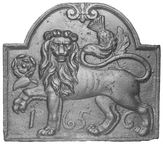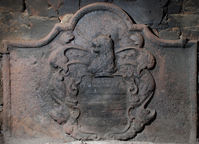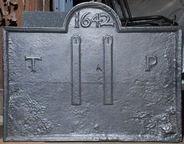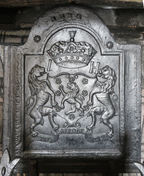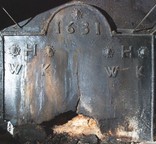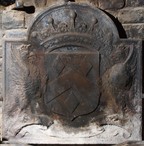-
349
Description: Arched rectangular shape; ovolo-moulded edging; Tudor royal shield, garter, crown, motto and supporters (crowned lion and dragon); Tudor rose to right of lion’s head, portcullis to left of dragon’s head; temp. Elizabeth I.
Notes: Three versions of this fireback are known, with differing edging and one without the rose and portcullis.
Copies of this fireback are known.
Inscription: [Garter] HONI SOIT QVI MAL Y PENSE / [motto] DIEV ET MON DROIT.
Arms: Tudor royal
- Decoration tags:
- rectangular with round arch (shape)
- ovolo (edging)
- whole carved pattern
- heraldic
- armorial
- royal
- text
Manufactured: in the late-16th century possibly in the Weald area of England.
Current location: Bramshill House, Bramshill, Hampshire, England.
Citation: Baines, J. M., 1958, Wealden Firebacks (Hastings Museum).
- Attached to series:
- Tudor royal armorial firebacks
-
207
Description: Arched rectangular shape; ovolo-moulded edge; Tudor royal shield, crown, garter and supporters (dragon and greyhound). Crowned rose on left, and crowned portcullis (grid of 16) on right side of crown; the supporters stand on a horizontal fillet; date panel with ovolo-moulding on top, central putto face splitting two parts of date with faces of putti in profile at each end.
Notes: Arms are of Edward VI. A very clear casting, almost certainly from the original pattern. There are several firebacks with the Tudor royal arms that were probably produced in the Spanish Netherlands, perhaps illustrating the association between England and Spain through the marriage of Henry VIII and Katherine of Aragon. The firebacks differ in several small details, such as the form and rotation of the Garter motto, the style of the crown, the positioning of the supporters in relation to the Garter, and the form and size of the crowned rose and portcullis.
Copies of this fireback are known.
Inscription: HONI SOIT QVI MAL I PENSE / 15 48
Arms: Tudor royal Edward VI
- Decoration tags:
- rectangular with round arch (shape)
- fillet (edging)
- whole carved pattern
- planklines
- heraldic
- armorial
- royal
- text
Manufactured: in 1548 possibly at Eisenschmitt Furnace in the Eifel area of Germany.
Current location: Ockwells Manor, Cox Green, Berkshire, England.
Citation: Kippenberger, A. 1973, Die Kunst der Ofenplatten (Düsseldorf, Verlag Stahleisen), p. 107.
-
853
Description: Arched rectangular shape; cavetto edging; three ostrich feathers issuing from a royal coronet; motto banner below.
Notes: The badge of the Prince of Wales; perhaps cast during the Commonwealth period; a copy at Rottingdean Grange (no. 670) has added initials.
Copies of this fireback are known.
Inscription: ICH [DIEN]
- Decoration tags:
- rectangular with round arch (shape)
- cavetto (edging)
- whole carved pattern
- heraldic
- royal
- text
- objects
Manufactured: in the mid-17th century in the Weald area of England.
Current location: not known.
Citation: Lloyd, N., 1925, 'Domestic Ironwork I', Architectural Review, 58, pp. 58-67.
- Attached to series:
- Prince of Wales firebacks
-
149
Description: Arched rectangular shape; ovolo moulded edging; date in arch; below arch two parallel, vertical straps, each with a buckle at the top; initials left and right of centre; rectangular stamp with bird, four times across top; larger rectangular stamp with unidentified animal, twice below initials.
Notes: The buckles suggest a connection with the Pelham family; the initials may relate to Sir Thomas Pelham, Bt. (1597-1654) who owned and operated ironworks at Waldron in Sussex. This is one of a few examples of a copy of a casting of the original pattern to which additional stamps had been added. Formerly part of the Ade Collection (from Grove Hill, Hellingly, Sussex).
Inscription: 1642 / T P
- Decoration tags:
- rectangular with round arch (shape)
- ovolo (edging)
- simple stamps
- carved stamps
- whole carved pattern
- individual numbers
- planklines
- text
- objects
Manufactured: in the mid-17th century possibly at Waldron Furnace in the Weald area of England.
Current location: Hastings Museum and Art Gallery, John's Place, Bohemia Road, Hastings, East Sussex, England.
Museum number: HASMG: 1952.51.61 (part of the Hastings Museum museum group)
- Attached to series:
- 1642 Pelham series
- Pelham family firebacks
-
399
Description: Arched rectangular shape; ovolo-moulded edging with inverted fleur-de-lys at top; lion passant guardant, with rose to the left and thistle above tail; date split between legs; single horizontal plank-line.
Notes: The boldness of the figuration suggests association with firebacks possibly cast at Brede Furnace in the same period.
Copies of this fireback are known.
Inscription: 1 6 5 6
- Decoration tags:
- rectangular with round arch (shape)
- cyma reversa/ogee (edging)
- whole carved pattern
- planklines
- heraldic
- text
- animals
- plants
Manufactured: in 1656 in the Weald area of England.
Current location: not known.
- Attached to series:
- Royalist series
-
913
Description: Rectangular with an arched rectangular style arch linked by symmetrical concave curves; ovolo moulding (top and sides); shield, helm, crest and mantling of the Fuller family. A number 7, the only visible part of the date seen on other castings is in the top right corner of the shield.
Notes: A carved armorial on a plain, edged base board; the arms of the Fullers of Brightling Park, Sussex: Argent, three bars and a canton gules; the crest; Out of a ducal coronet Or, a lion’s head argent; the Fullers were iron masters and gun founders in the first half of the 18th century, operating Heathfield furnace, where it is likely that this fireback was cast.
Inscription: [1] 7 / [4] [7]
Arms: Fuller, of Brightling, Sussex
- Decoration tags:
- rectangular with round arch (shape)
- ovolo (edging)
- carved pattern panels
- armorial
Manufactured: in 1747 probably at Heathfield Furnace in the Weald area of England.
Current location: in private hands, Brightling, East Sussex, England.
- Attached to series:
- Ironmasters armorial series
- Personal armorial firebacks
-
217
Description: Arched rectangular shape; ovolo edging; date in arch; below arch, two parallel straps, each with a buckle at the top; initials left and right of centre; rectangular stamp with bird, four times across top.
Notes: The buckles, the date and the initials all appear to be separate stamps but attached to the base board before being impressed to form the mould, as they are identically positioned on all castings. The buckles suggest a connection with the Pelham family; the initials may relate to Sir Thomas Pelham, Bt. (1597-1654) who owned and operated ironworks at Waldron and Crowhurst in Sussex. This would appear to be a casting of the original pattern.
Copies of this fireback are known.
Inscription: 1642 / T P
- Decoration tags:
- rectangular with round arch (shape)
- ovolo (edging)
- whole carved pattern
- individual numbers
- planklines
- text
- objects
Manufactured: in 1642 probably at Waldron Furnace in the Weald area of England.
Current location: Brighton Museum and Art Gallery, Brighton, East Sussex, England.
Museum number: HA105912 (part of the Brighton Museum museum group)
Citation: Lindsay, J. S., 1927, Iron & Brass Implements of the English House (London, The Medici Society).
- Attached to series:
- 1642 Pelham series
- Pelham family firebacks
-
972
Description: Arched rectangular shape with ovolo-moulded edging and extensions to sides and top; central shield bearing arms with lion rampant supporters and motto scroll beneath; above, a marquesal coronet; date (over-pressed) in extension above main panel; inserted initials (slightly over-pressed) on either side of coronet.
Notes: The arms are of Henry Pierrepont, marquess of Dorchester and earl of Kingston-upon-Hull, of Thoresby Hall, Nottinghamshire (blazon: argent semi of cinquefoils gules, a lion rampant sable), with the motto: Pie Repone Te (Place yourself piously), a pun on the name, Pierrepont. Confusingly, the marquisate of Dorchester was created twice for members of the same family. In 1645 it was created for Henry Pierrepont, 2nd earl of Kingston-upon-Hull, becoming extinct on his death without surviving male issue in 1680. It was created again for Evelyn Pierrepont, the 5th earl of Kingston in 1706 who was subsequently elevated to the dukedom of Kingston in 1715. The original casting may therefore have dated to between 1645 and 1680 or between 1706 and 1715. The initials may be related to the Halls, the 2nd Duke of Kingston's mother's family, and were added to a subsequent casting which, in turn, could have pre-dated the addition of the dated extensions which have obliterated 'Dutch'-style dolphins known to have surmounted the original.
Inscription: 1722 / I H / PIE REPONE TE
Arms: Pierrepont, Marquess of Dorchester
- Decoration tags:
- rectangular with round arch (shape)
- ovolo (edging)
- whole carved pattern
- extension panels
- armorial
- text
Manufactured: in 1722 in England.
Current location: Red Lodge, Park Row, Bristol, England.
Museum number: NX420 (part of the Bristol Museums, Galleries and Archives museum group)
- Attached to series:
- Personal armorial firebacks
- Pierrepont series
-
1028
Description: Arched rectangular shape; twisted rope edging (top and sides); date in arch; initial triads in top shoulders of plate; small mask patera repeated once above date and on each side of 'H' initials.
Notes: The small mask patera has not been seen on other firebacks.
Inscription: 1631 / WHK [triad] WHK [triad]
- Decoration tags:
- rectangular with round arch (shape)
- rope (edging)
- carved stamps
- individual letters
- individual numbers
- text
- objects
Manufactured: in 1631 in England.
Current location: The Lygon Arms, High Street, Broadway, Worcestershire, England.
- Attached to series:
- Miscellaneous stamp firebacks
-
1029
Description: Arched rectangular shape; cavetto-moulded edging; shield, supporters, earl's coronet and motto scroll.
Notes: The arms are of the Hyde family: azure, a chevron between three lozenges or; the supporters: two eagles, wings endorsed sable, ducally crowned and charged on the breast with a cross or; Edward Hyde (1609-74) was created earl of Clarendon in 1661. An excrescence over the sinister supporter indicates where the iron was poured clumsily into the open sand mould.
Arms: Hyde, earls of Clarendon
- Decoration tags:
- rectangular with round arch (shape)
- cavetto (edging)
- whole carved pattern
- heraldic
- armorial
Manufactured: in the mid- to late-17th century in England.
Current location: The Lygon Arms, High Street, Broadway, Worcestershire, England.
- Attached to series:
- Personal armorial firebacks
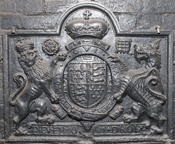
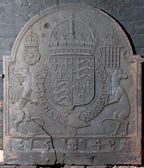
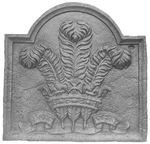
.jpg)
